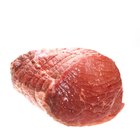milosradinovic/iStock/GettyImages
Most meats are relatively bland in their natural condition. Making them taste richly savory requires a degree of skill on the cook's part, and usually combines good cooking techniques with deft seasoning. Searing the meats is an important step, browning the surface and creating intense new flavors. Flavoring the meat with a marinade is another alternative.
Marinating Basics
Marinating meats is a very straightforward process. Marinades usually include an acidic ingredient such as wine, fruit juice or buttermilk, which provides a modest amount of tenderization. Most include spices, fresh herbs and other flavorings, and some kind of oil. Some flavor compounds are water soluble and are carried b the acidic ingredient, while others are fat-soluble and are conveyed by the oil. In some cases, the cook simmers the marinade to infuse it with deep flavors, then strains it and cools it before combining it with the meat. The effect is the same, but the marinade becomes more richly flavored.
Food-Safe Refrigeration
Although the acidity in a marinade provides some protection against bacterial activity, marinated meats must still be handled carefully to minimize the risk of food-borne illness. Keep your meats in the refrigerator until you're ready to use them, and make sure your hands, knives and cutting boards are scrupulously clean. Marinate your meats in zipper-seal bags or sealed food-grade containers. Marinated poultry can be refrigerated safely for two days before it's cooked, and other meats can be stored for up to five days in the refrigerator. However, longer isn't usually better.
Quality Is the Question
The acidity and strong flavors of a marinade add a pleasant flavor to your meats and poultry during the first several hours. After that, they can rapidly become overpowering. With delicately flavored poultry, recipes often call for marinating times as short as a half-hour. Few recommend longer than overnight marinating. After that, the tang from the acidity becomes too assertive. The texture of the meat is also affected, with small pieces or slices developing an odd, mushy texture. The exception to this rule is large cuts of meat, especially wild-caught game, which can marinate for three days or longer.
A Few Tips
If you need to store your marinated, uncooked meat for longer than a day, it's usually better to package and freeze it after a few hours in the marinade. Draining the marinade from the meat minimizes any further effect, so it's your best option if you've already marinated your meat for the optimal length of time. Alternatively you can freeze the meat in the marinade as soon as it's mixed, or shortly after. The marinade continues to act on the meat while it's frozen, and is ready to cook as soon as it thaws. Freeze portions of unused marinade separately, to use as a glaze or sauce. The marinade from the meat can be used instead, but it should be boiled first to kill any bacteria.
Related Articles
Can I Use White Vinegar to Tenderize ...

Can You Marinate Boneless Pork Sirloin ...

How to Cook Corned Beef Without Being ...
Can You Freeze Shish Kabobs?

How to Know if Marinated Steak Is Bad

Can You Marinate a Pork Shoulder ...
Do You Drain the Marinade Before ...
Can You Marinate & Refreeze Beef?
Easy Pork Chop Marinade Recipe

How to Marinate T-Bone Steak

How to Make Marinade for Roast Beef

How to Cook Pan Fried Deer Tenderloin

Does a Dry Rub Meat Tenderizer Need to ...

How to Cook a Rolled Beef Chuck Roast ...

What Do You Put on a Steak Before ...

How to Cook a Center Cut Pork Loin in a ...

How to Brine Pork Loins

What Can You Do With London Broil Steak?

Does Chicken Go Bad if You Marinate It ...

How to Soak Deer Meat in Baking Soda
References
- On Food and Cooking: The Science and Lore of the Kitchen; Harold McGee
- Food Safety.gov: Marinades -- The Busy Cook's Friend
Writer Bio
Fred Decker is a trained chef and prolific freelance writer. In previous careers, he sold insurance and mutual funds, and was a longtime retailer. He was educated at Memorial University of Newfoundland and the Northern Alberta Institute of Technology. His articles have appeared on numerous home and garden sites including GoneOutdoors, TheNest and eHow.